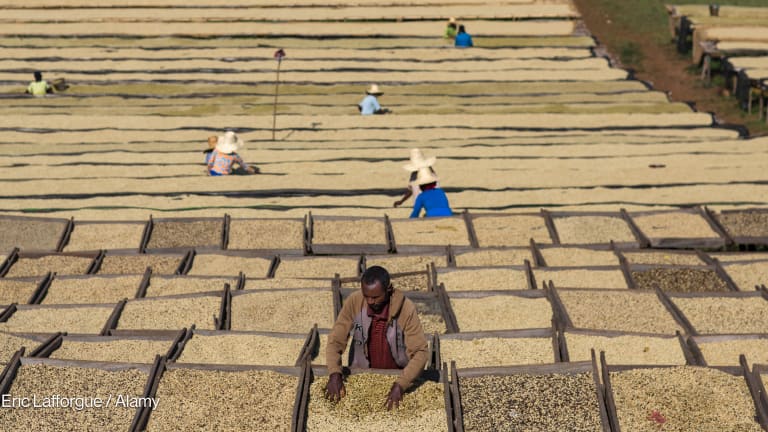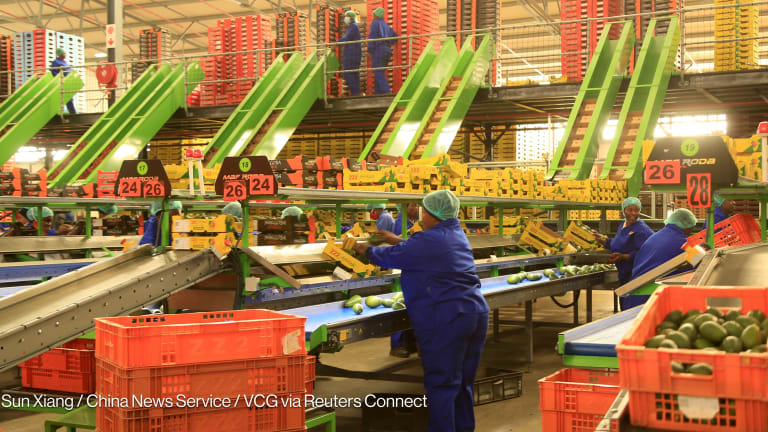Inside the latest Europe-Africa summit deliverables
A plan to rely more on the EU's own border agency in Africa is among those raising alarm.
Construction of a fiber cable connecting Europe and Africa, an expanded role for the European Union’s border agency in Africa, and progress on reallocation of Special Drawing Rights are among the deliverables being planned for a summit of national leaders from the EU and African Union in Brussels on Feb. 17 to 18. EU states are still discussing a list of projects, seen by Devex, and refining them through French officials who hold the rotating presidency of the Council of the EU. The AU side is not directly involved in the discussions, though EU documents refer to the AU’s AGENDA 2063 document as proof that the two continents’ interests are aligned. One “flagship proposal” under consideration would involve “developing the means of cooperation of Frontex with African countries” including “the swift conclusion of working arrangements including provisions on operational cooperation in the field of return, readmission and reintegration with African countries and deployment of EU return liaison officers (EURLO) to reinforce cooperation with national authorities.” The plan also says status agreements allowing Frontex to “support operationally border management tasks in African countries in order to prevent dangerous departures should be explored.” Status agreements are required for Frontex, the European border and coast guard, to send border guards to third countries. So far the agency has these with Serbia, Montenegro, and Albania. Frontex may send staff outside the EU for other tasks, such as return operations, through working arrangements, which it currently has with 18 states, mostly in the EU’s neighborhood, though also including Nigeria and Cape Verde. The agency has been criticized of late over a lack of transparency and turning a blind eye to human rights violations on the EU’s borders. Frontex Executive Director Fabrice Leggeri told reporters last month that "clarification (is needed) how to strike the balance between prohibiting illegal crossing while maintaining access to international protection for those who are in need.” A Frontex spokesperson was not immediately able to comment on the proposal. Erik Marquardt, a German Greens member of the European Parliament’s Frontex Scrutiny Working Group, emailed Devex Wednesday that “an agency that already cannot be held accountable in the EU, should not be trusted to operate outside the Union, especially not in countries with difficult human rights track records.” “How is the logical next step to send the agency even further away from the EU, knowing that the human rights situation is often problematic in countries like Mali, Mauritania or Niger?” Marquardt asked. By focusing on return, readmission, and the “inadequate” legal pathways that already exist, Josephine Liebl, head of advocacy at the European Council on Refugees and Exiles, told Devex that the EU summit offer on migration represents “yet another example of the EU’s pretense of a partnership on migration which only serves EU interests.” The internal planning document states that the European Commission will mobilize €4.35 billion ($4.9 billion) from its 2021-2027 foreign aid budget to address migration issues in Africa, and will tap funds from the EU’s migration and border management budget “as appropriate.” A spokesperson for the African Union was not immediately available for comment. Other initiatives under consideration by the EU include a Global Green Bonds Initiative to improve demand for such bonds issued by African countries, as well as the supply of projects to be financed; the possibility of supporting vaccine manufacturing in countries beyond the already-announced Senegal, South Africa, Rwanda, and Ghana; and “an enabled environment for Sexual and Reproductive Health and Rights,” a sensitive political issue in both Africa and the EU. The summit will also flesh out the commission’s Global Gateway initiative, an attempt to react to China’s Belt and Road initiative and meet African leaders’ frequent calls for greater infrastructure investment. The gateway is mostly a branding exercise for funds already locked in under the commission’s 2021-2027 budget, though details have been scarce since its launch in December on exactly what kind of green, connectivity-related projects it will support. The “flagship actions” under consideration for the gateway include: • Building an international submarine fiber cable connecting the African and European continents along the Atlantic coast. • Building a network of fiber-optic cables across sub-Saharan Africa. • Launching Green Data Centres in Africa to foster African data storage and processing capacity. • Generation and access to sustainable energy such as clean hydrogen and solar. • Just Energy Transition Partnerships envisaged with Senegal, Côte d'Ivoire, Egypt, Morocco, Nigeria, and Rwanda — amid African concerns that Brussels’ green focus in its external investments ignores Africa’s small contribution to global carbon emissions and need for reliable energy sources in order to grow its economies. More information on the gateway will be announced by Commission President Ursula von der Leyen next week, on a trip to Senegal with other commissioners. The overall figure for the investment package at the summit is still unknown, with Bloomberg reporting Wednesday that Germany believes some projects are not ready yet and other states are unable to commit concrete figures until their own national budgets are settled. The summit is also a chance to push EU countries to reallocate more of their Special Drawing Rights, issued by the International Monetary Fund in response to the COVID-19 pandemic, to African economies. The SDR commitment as of Feb. 17 from “Team Europe” — meaning EU member states, institutions, and development banks — is left blank in the current investment package draft.
Construction of a fiber cable connecting Europe and Africa, an expanded role for the European Union’s border agency in Africa, and progress on reallocation of Special Drawing Rights are among the deliverables being planned for a summit of national leaders from the EU and African Union in Brussels on Feb. 17 to 18.
EU states are still discussing a list of projects, seen by Devex, and refining them through French officials who hold the rotating presidency of the Council of the EU. The AU side is not directly involved in the discussions, though EU documents refer to the AU’s AGENDA 2063 document as proof that the two continents’ interests are aligned.
One “flagship proposal” under consideration would involve “developing the means of cooperation of Frontex with African countries” including “the swift conclusion of working arrangements including provisions on operational cooperation in the field of return, readmission and reintegration with African countries and deployment of EU return liaison officers (EURLO) to reinforce cooperation with national authorities.”
This story is forDevex Promembers
Unlock this story now with a 15-day free trial of Devex Pro.
With a Devex Pro subscription you'll get access to deeper analysis and exclusive insights from our reporters and analysts.
Start my free trialRequest a group subscription Printing articles to share with others is a breach of our terms and conditions and copyright policy. Please use the sharing options on the left side of the article. Devex Pro members may share up to 10 articles per month using the Pro share tool ( ).
Vince Chadwick is a contributing reporter at Devex. A law graduate from Melbourne, Australia, he was social affairs reporter for The Age newspaper, before covering breaking news, the arts, and public policy across Europe, including as a reporter and editor at POLITICO Europe. He was long-listed for International Journalist of the Year at the 2023 One World Media Awards.








